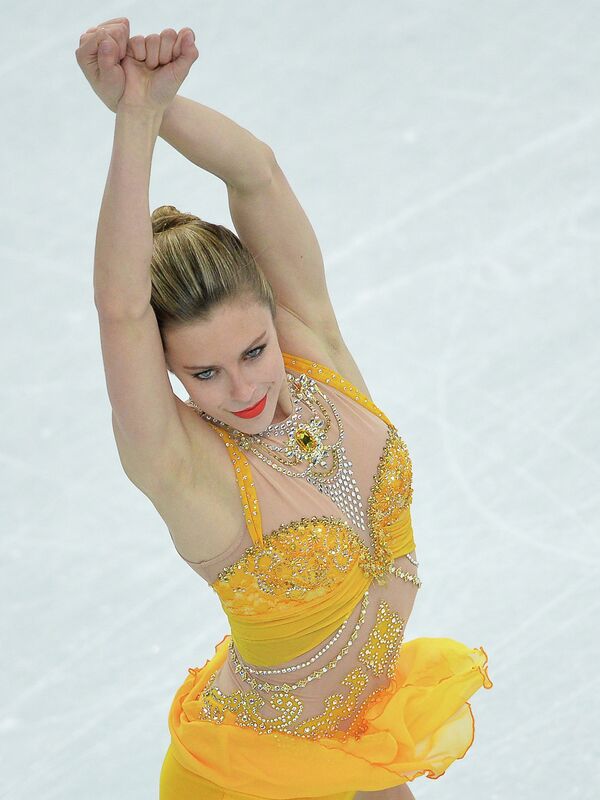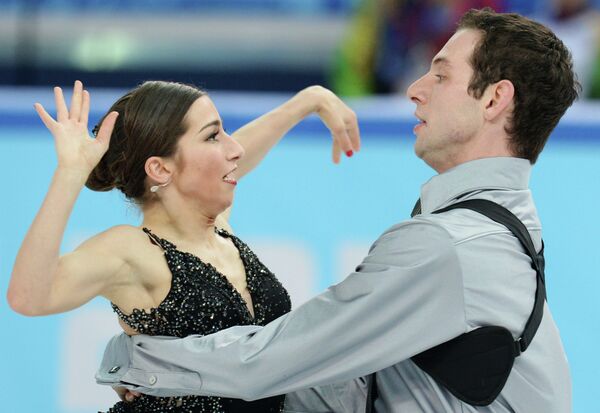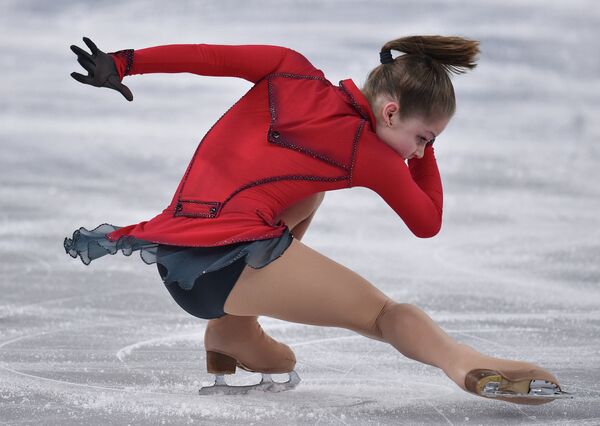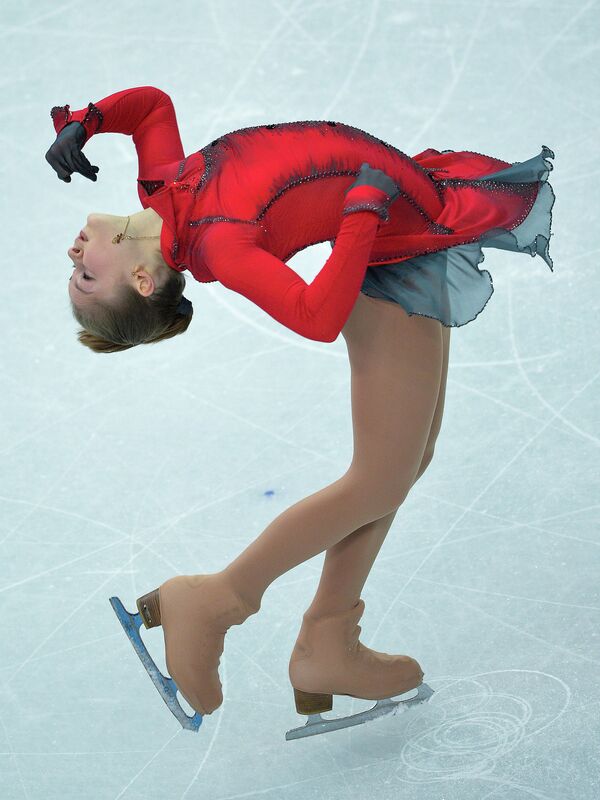SOCHI, February 22 (Kristen Blyth, RIA Novosti) – “I’ll be honest,” says Jan Longmire, a figure skating costume designer based in California: “Skaters are snobs.”
She doesn’t mean that in a judgmental way – just that ice skating, a sport that demands gravity-flouting leaps and twirls from athletes balancing on a pair of thin metal blades, begs precision. A skater’s meticulousness extends naturally from perfecting a routine to nailing down an outfit.
Though the figure skating costume is a minor part of any performance, more sweat and tears go into the placement of straps and sparkles than the average spectator realizes. As the skating portion of this year’s Winter Olympic Games in Sochi winds down to a close, costume designers shared the facts about these wearable works of art.
Hand-Made, Labor-Intensive, Pricey
Skating costumes are sewn by hand, and thus both time-consuming and extremely expensive. Dresses can cost between $2,000 and $3,000 each and take up to 100 hours to make.
The costume material itself is cheap: Designers can buy Lycra or other stretchy fabric for a few dollars per yard. But crystals are more costly, especially when there are tens of thousands of them on a single dress, and the designer applies each one – and does stitching and other beading – by hand.
“It’s very labor-intensive,” said Longmire, who has designed costumes for 35 years. “They have to be constructed carefully for close-up photography. All of your efforts go into making this piece of elastic fabric look like anything but what it is – which is basically just a bathing suit.”
The Ice Is a Stage
Figure skating routines are set up like a theater performance, with the athletes acting out roles in history or works of art. The music sets the basis for the construction of the routine as well as the costume design, said Susan Doyle, the business manager for US-based skating costume company Yumi Couture.
While they’re performing, skaters transform into their chosen character, be it Juliet pining for Romeo or 1920s flappers shaking a leg.
Yulia Lipnitskaya, for instance, the 15-year-old Russian wunderkind who won gold in this year’s team free skating, assumed the role of the famous girl in the red coat from the Hollywood Holocaust drama “Schindler’s List.”
Longmire said that US figure skater Ashley Wagner, for whom she designs costumes, wears a bright yellow dress during specific programs to get into the character of Delilah, a Biblical temptress.
“Delilah is not a nice girl, so yellow sends a strong message,” Longmire says. For Wagner, “it’s, ‘I don’t really wear yellow as Ashley, but for four minutes, I’m not Ashley.’”
Pop Culture a Major Influence
Remember the little girls who watch Disney movies and then prance around the house in their mother’s heels and pearls, pretending to be a princess? Figure skaters, said Doyle, are the same – taking cues from films, fashion and music to shape their performances.

“Movies play a big role. After ‘Slumdog Millionaire’ came out [in 2008], we got so many skaters asking for an Indian-style outfit,” she said.
In an example from this year’s Olympics, two of Yumi Couture’s clients, American skating pair Marissa Castelli and Simon Shnapir, wore outfits conjuring up James Bond and his notoriously sexy “Bond girl.”
They danced to music from “Skyfall,” the latest 007 installment released in 2012, in the Sochi pairs free skating competition. (Unlike a real Bond movie, however, the pair was soundly beaten by the Russians, who took gold and silver in the event while the Americans finished ninth.)
Costume designers should expect to receive requests for old-fashioned outfits next season, Doyle predicted, based on the blockbuster success last year of movies like “American Hustle.”
Guidelines for What’s Appropriate
Figure skating costumes are governed by a set of rules dictating what the athletes may – and may not – wear.
Some are clear and strict. “Ladies must wear a skirt,” according to the rules issued by the International Skating Union, which governs the sport worldwide. “Men must wear full-length trousers: no tights are allowed and the Man’s costume may not be sleeveless.”

Other guidelines leave room for judges’ interpretation. Costumes should not “be garish or theatrical in design,” for example, and women’s dresses cannot “give the effect of excessive nudity inappropriate for an athletic sport.”
Miniskirts that fail to cover a woman’s backside, apparently, do not count as excessive nudity. Instead, the nakedness clause refers more to the “nude illusion” effect, said Longmire, referring to the proportion of opaque to skin-colored fabric in an outfit.
Most skaters stick to a balance of 60 percent color to 40 percent flesh tone, she said, “otherwise they look slightly undressed, which the judges don’t usually approve of.”
Other rules are ignored entirely.
The ISU guidelines say clearly that no props or accessories are permitted, and costume violations are technically punished by point deductions. However, skaters regularly perform while wearing earrings, necklaces and hairpieces without any formal consequences.
Costumes Can Malfunction
“This is a very small garment you’re asking to do an enormous job,” Longmire said. “Just about anything can happen. It’s the occupational hazard of being a costumer: You are terrified of the malfunction.”
Seams splitting and crystals falling off aren’t the only embarrassing slip-ups to happen to an outfit – “nip slips” are on the list too.
These usually happen when a female skater performs a Biellmann spin, where she twirls on one foot while holding the other up over her head.
Fragile or daring outfits can also be to blame. Russian skater Yekaterina Rublyova famously exposed one breast during the 2009 European Championships while twirling in a hot pink strapless dress.
Win or lose, much of the flair and drama associated with figure skating comes from the costumes, Longmire said. If the outfits are not the stars of the show, they’re at least a bit of stardust.
“As soon as a skater leaves the ice, you don’t remember what they did,” Longmire said. “You remember what they wore. … If everyone went out in black training pants, the sport would be dead.”


